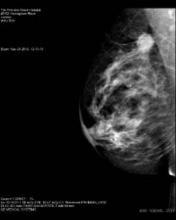CHICAGO – Annual mammograms dramatically reduced the risk of mastectomy in women who were diagnosed with breast cancer between the ages of 40 and 50 years, according to a retrospective study of 459 patients.
Women who underwent mammography a year or less prior to a breast cancer diagnosis had a mastectomy rate less than half that of women whose last previous mammogram was more than a year prior to diagnosis and women who had never had a mammogram (22%, 47%, and 52%, respectively), reported Dr. Nicholas Perry, director of the London Breast Institute at the Princess Grace Hospital.
The relative risk of mastectomy rose significantly with length of time since the previous mammogram, Dr. Perry said at the annual meeting of the Radiological Society of North America.
Dr. Perry and his colleagues reviewed clinical data on 1,138 women diagnosed with breast cancer at the London Breast Institute between January 2003 and October 2010. Of these patients, 459 (40%) were under the age of 50, and clinical/imaging data were available on 184 of this under-50 group. Of the 184, only 48 (26%) had undergone mammography prior to their diagnosis, and 136 (74%) had never had a previous mammogram.
Among the 48 who had undergone mammography previously, the length of time between that mammogram and a breast cancer diagnosis was more than 2 years for 15 (8%), between 1 and 2 years for 15 (8%), and 12 months or less for 18 (10%).
The average tumor size, incidence of multifocality, and incidence of high-grade tumor were significantly less in women who had undergone mammography at or within a year prior to diagnosis than in women whose last mammogram was more than a year prior to diagnosis and women who had never had a mammogram (17.8 mm, 24 mm, and 29 mm; 12%, 22%, and 36%; and 31%, 32%, and 46%, respectively).
The findings deliver "strong clinical evidence to support annual screening for women from age 40," Dr. Perry said. The current breast cancer screening guidelines of the American Cancer Society recommend annual mammograms for all women starting at age 40.
Yearly breast cancer screenings reduce mastectomy risk because they increase the likelihood of a tumor being found when it is smaller and not yet multifocal, Dr. Perry said.
"These data are striking, but they actually should not be surprising," he said. He noted that 7,000 women between the ages of 40 and 50 are diagnosed with breast cancer in the United Kingdom each year. "It’s a sad figure that screening only accounts for 2% of those 7,000, compared with 54% of women aged 50-75 with breast cancer."
An estimated 40% of all life-years lost to breast cancer are attributable to women diagnosed outside screening programs between the ages of 35 and 49, Dr. Perry noted. "Younger women have more aggressive breast cancers, and it’s the single commonest cause of death in women between the ages of 35 and 54. So there’s certainly an argument to be made that 40- to 50-year-old women have the most to gain from early detection, at the very least in terms of life-years ahead of them," he said.
An estimated 37,000 women under the age of 50 are diagnosed with breast cancer in the United States each year, Dr. Perry added. "If you apply our results to these women, that would result in more than 10,000 American women spared from mastectomy each year."
Dr. Perry said he had no relevant financial disclosures.


